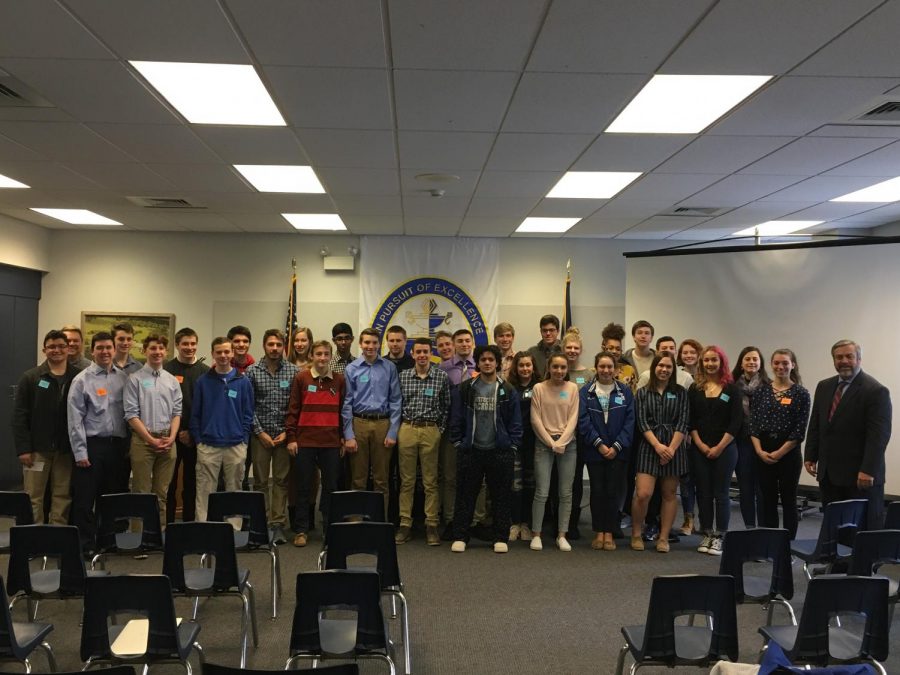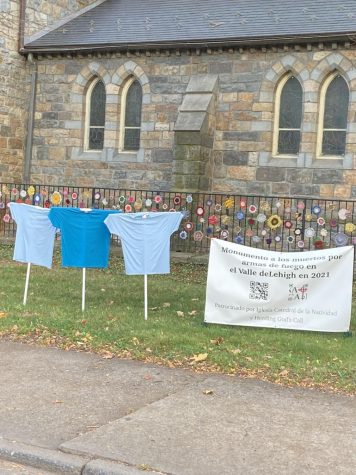JSA Hosts Event with PA Senator Pat Browne
Senator Browne emphasized the power of listening during his presentation.
As the first wave of 2020 presidential candidates step forward, attention-grabbing media and dramatic scandals in the presidential race can often overshadow the work done by state and local governments. However, it is as important as ever to look to state and local representatives to make change.
On March 1, the Junior State of America invited Pennsylvania State Senator Pat Browne to speak with students at Southern Lehigh High School. While the event was hosted by students in the JSA, students schoolwide were welcome to sign up and ask questions. Over 35 students participated.
“I really like politics and wanted to see more of them at a local government level,“ sophomore Jack Ziets said.
“I’m in JSA and politics is an interest of mine, so I thought it’d be a good opportunity to hear from a state senator,” freshman Noah Denton said. “I thought [the meeting] went pretty well. He seems like a great guy.”
Throughout his speech, Senator Browne spoke about his experience before and after becoming a senator. In addition to discussing some problems he has encountered along the road, he also shared the deep pride and hope he sees in Pennsylvania’s future. As for politics, his overarching theme was to empathize the importance of listening to all sides of a discussion.
“You come to realize [as a politician] that there’s a certain feature on your body that’s the most important – your ears,” Senator Browne said. “The best [politicians] are the ones that listen. One thing about the place I represent is that just [as] our country is a very diverse place, we live in a very diverse state, and we live in a very diverse community.”
Senator Pat Browne has lived all but eight years of his life in Pennsylvania. In fact, he is a Lehigh Valley native, growing up in Allentown and graduating from Allentown Central Catholic High School. He received a bachelor’s degree in Business Administration from the University of Notre Dame and earned a law degree from Temple University.
Prior to holding political office, Senator Browne was employed in Philadelphia as a tax manager and senior tax associate at Cooper & Lybrand and Price Waterhouse. While he was working in inner city Philadelphia, the economic divide he saw in the urban community inspired him to become a politician.
“It was not a good time,” Senator Browne said. “As a finance guy, I didn’t want to be advising my clients to leave Pennsylvania. I was proud of my state. But I had to give them objective advice and tell them that financially they’d be better somewhere else. That really bothered me.”
Once Senator Browne decided to run for office, he moved back to the Lehigh Valley to campaign. He was first elected to the Pennsylvania House of Representatives in 1995 and held the position for ten years. In 2005, he won a Special Election to fill the Pennsylvania Senate seat vacated by Rep. Charlie Dent. He was elected for two more terms before becoming the Republican Whip of the Pennsylvania Senate in 2011.
Currently, Pat Browne serves as a chairman of the PA Senate Appropriations committee. The committee, which reviews the economic consequences of new lesgliarion, plays a crucial part in developing the state budget.
Senator Brown is also a member of four other committees, including Education, Finance, Health & Human Services, and Local Government.
“I look for consensus and collaboration,” Senator Browne said. “The only way to be successful in politics is if you’re willing to be in the room with people who don’t agree with you and have different opinions. Eventually, you will able to come to a middle ground with something that you both need. The ones that are least successful at politics are the ones that hold onto their opinions and are never willing to listen to someone else’s.”
As a former Certified Public Accountant, Senator Browne specializes on the fiscal consequences of the governor’s legislation. While being an accountant may not be the typical stepping stone into politics, Senator Browne believes that different life experiences give politicians unique advantages because they are able to focus on specific topics.
“Don’t worry too much about what ‘path’ you’re on,” Senator Browne said. “No matter which path you choose, there will always be constituents who can relate to you. That’s the most important part: it’s all about shared common experiences.”
During the conference, Senator Browne addressed some issues he believes are affecting Pennsylvania. In correlation to being an “aging” state, with 17.8 percent of the total population in Pennsylvania comprised of people over the age of 65, Senator Brown questions why young people are moving away from Pennsylvania.
“We need to talk about why our young folks are not staying,” he said. “Why they are looking for opportunities elsewhere?”
While currently the situation seems bleak, Senator Browne is energized by the younger generation’s interest in living in cities. Unlike older generations, who spread out into suburbs, many millennials are looking toward cities for their diversity, convenience, career opportunity, and social scene. Senator Browne believes that a new wave of urbanization could bring back economic success to cities.
“The needs of our cities are a lot more segregated than they used to be. If you just look at Allentown, the city was going in a very strong direction when I was growing up, but it’s very different now,” Senator Browne said. “It’s important to understand that income diversity is important for a city to thrive….There needs to be enough people to invest in cities for them to do well.”
Senator Browne places a lot of faith in the younger generations. As a politician, he hopes that he will be in office long enough to see voter turnout for elections go up.
“I have a very strong sense of pride for Pennsylvania,” Senator Browne said. “What makes this job meaningful is that at the end of the day, I understand that I got something done. Everytime we do that, something gets better.”

Saskia Van’t Hof is a fourth-year staff reporter and second-year Editor-in-Chief and Opinion Editor for the Spotlight. She is also president of Key Club,...












